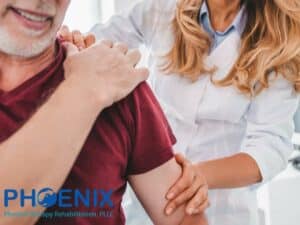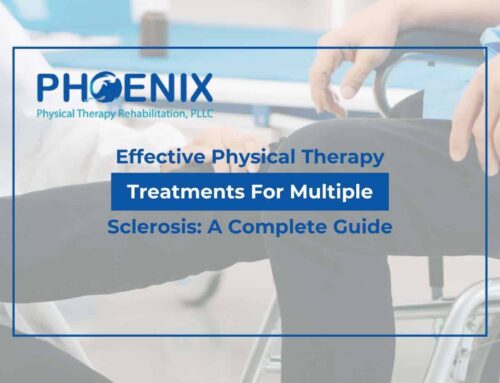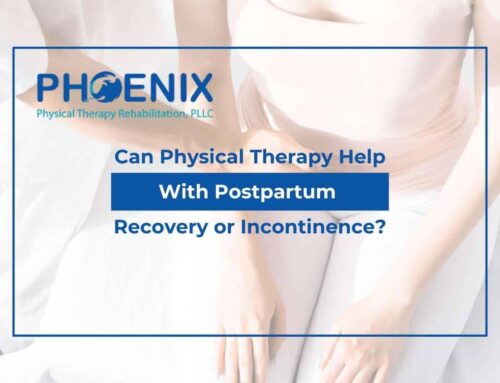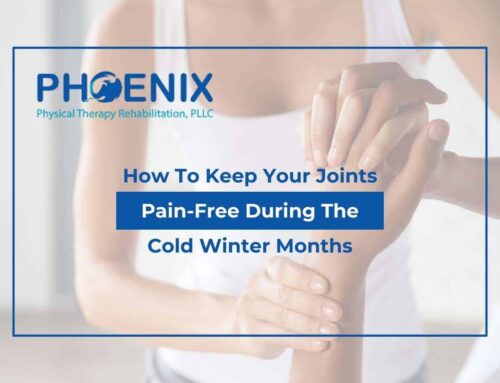Everything You Should Know About Chronic Joint Pain
Joint pain is quite common. However, this does not mean that it should be normalized. After all, it can greatly limit your daily life, even with “insignificant” activities such as getting out of bed or walking. For this reason, it is key to avoid chronic pain, which occurs when structures become inflamed and worn down over time.
Fortunately, there are many ways to deal with the symptoms of chronic joint pain. Here we explain why seeing a physical therapist is one of the best options for achieving real recovery.
Common Joint Pain Symptoms That May Signal a Serious Issue

The main symptoms are usually inflammation, stiffness, or loss of mobility. Of course, this is not the case in severe cases. However, chronic joint pain can make activities such as climbing stairs or carrying bags very difficult. Therefore, it is important to understand if there are signs that may indicate a more serious condition that may require professional intervention. For example:
- Significant loss of range of motion. In other words, if you find it difficult to move your body as you did before.
- Pain that worsens at night. This may be a sign that you are not even resting well.
- Intense stiffness upon waking. You should not ignore this symptom, as it could indicate another type of condition.
- Persistent redness, heat, or swelling in the area. This can cause pain when bearing weight or walking.
In any of these cases, it is advisable to consider joint pain treatments. With the right specialist, you can prevent permanent damage to your body.
Key Risk Factors That Contribute To Joint Pain
Not everyone is equally likely to suffer from joint pain. Generally, these factors can increase the risk:
- Being over 50 years old. This is a risk factor that almost everyone takes into account.
- Previous injuries. If you have suffered falls, accidents, or surgery, you increase your chances.
- Being overweight. This increases the load on your knees and hips, making you more vulnerable to these pains.
- Sedentary lifestyle. If you don’t get regular physical activity, you also increase your chances of suffering from this problem.
- High-risk jobs. If you are constantly exposed to heavy lifting, you increase your chances of suffering from this problem.
- Genetic factors. If your family suffers from inflammatory diseases such as arthritis, you may be at greater risk.
In any case, when you contact physical therapists, they will tell you what lifestyle changes you need to make to improve your symptoms and prevent further problems.
Underlying Causes Of Joint Pain & Inflammation
Do you experience joint pain? It is important to be aware of some of the main causes of inflammation and discomfort. These include:
- Osteoarthritis: This is usually the most common cause. It occurs when the cartilage gradually breaks down, causing your bones to rub together. It is often associated with aging, but also with excess weight or old injuries. It can be quite painful.
- Rheumatoid arthritis: This is an autoimmune disease that inflames the joints, especially the hands and wrists. It can cause constant inflammation and destroy cartilage or bones if left untreated. It can also cause fatigue.
- Traumatic injuries: If you have been injured playing sports or in an accident, you may experience persistent pain. It is essential to seek sports physical therapy services in a timely manner, as early recovery will reduce the chances of persistent discomfort.
These are just some of the causes of persistent discomfort in your body. You should always consult a specialist to identify yours.
Traditional Medical Treatments For Joint Pain
You already know the causes. Let’s look at the solutions. The key here is to control the symptoms so that they don’t interfere with your daily life. Here are the main treatments.
Physical Therapy For Joint Pain Management
Physical therapy is highly effective if you want to avoid surgery and regain your quality of life. For example, through manual therapy or other alternatives, it is possible to perform:
- Strengthening exercises, which will allow you to protect your joints and avoid major problems.
- Professional guided stretching, essential for reducing tension and improving your body’s flexibility.
- Postural education, as it is important to avoid chronic poor posture that can cause further damage in the long term.
This approach has a high success rate, as it allows you to regain movement and reduce chronic pain in your body.
Over-The-Counter Pain Relief Medications For Joint Pain
Over-the-counter medications can help relieve pain. Generally, you can use:
- Ibuprofen and naproxen (anti-inflammatories)
- Acetaminophen (pain reliever)
- Topical creams with diclofenac or menthol
However, these can only relieve mild episodes of pain and should never be used as a long-term solution. In fact, you should always consult a specialist before deciding to take any medication.
Prescription Medications Used to Treat Joint Pain
Is the pain severe and persistent? In that case, doctors may prescribe:
- Oral or injected corticosteroids
- Intra-articular injections of hyaluronic acid
- Immunosuppressive drugs for rheumatoid arthritis
This is a great way to provide relief, but it needs to be complemented with physical therapy techniques such as kinesio taping to prevent the problem from recurring.
Surgical Treatment Options for Severe Joint Pain
If the damage is severe or you have lost mobility, your doctor may recommend surgery. For example:
- Arthroscopy
- Ligament or meniscus repair
- Total knee or hip replacement
Physical therapy is not optional in these cases, as you will be advised to do different exercises both before and after surgery to improve the outcome.
Natural, Non-Invasive & Holistic Remedies For Joint Pain
You can also try some alternative and natural approaches to relieve pain. For example:
- Heat and cold packs
- Natural supplements such as omega-3 or turmeric
- Acupuncture for pain relief
- Therapeutic massage
- Yoga or gentle stretching
- Dietary changes to prevent inflammation
Never make a radical change in your life without professional support. Consult a specialist first.
When Joint Pain Should Be Evaluated by a Healthcare Provider

- The pain is intense and lasts for more than 6 weeks.
- You cannot move your joints.
- There is swelling, fever, or redness.
- The pain is disrupting your daily life.
- You have tried several home remedies and nothing has changed.
In these cases, it is best to consult a specialist to avoid further complications.
How to Find the Right Physical Therapist for Joint Pain Relief
To do this, ask about the services available. For example, if they specialize in spinal decompression therapy, you may need something else.
Make sure they create a plan that allows you to regain full functionality of your body. This is something we do at Phoenix Physical Therapy & Rehabilitation, and we highly recommend consulting physical therapists in Brooklyn for a similar approach. We develop a strategy to relieve pain. Contact us now.
Phoenix Physical Therapy
Rosedale Location
23520 147th Avenue, Suite 1,
Rosedale, NY, 11422
Brooklyn Location
7510 4th Ave., Suite 3,
Brooklyn, NY, 11209
Phone: (347) 733-1916







